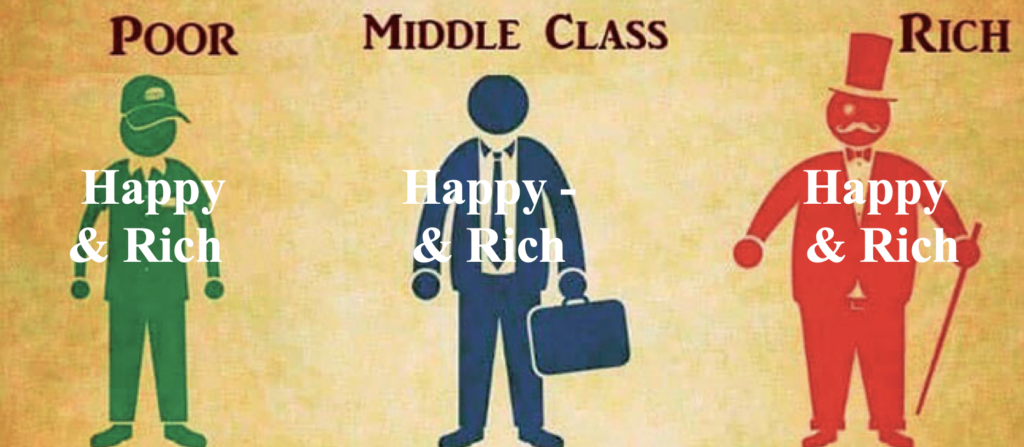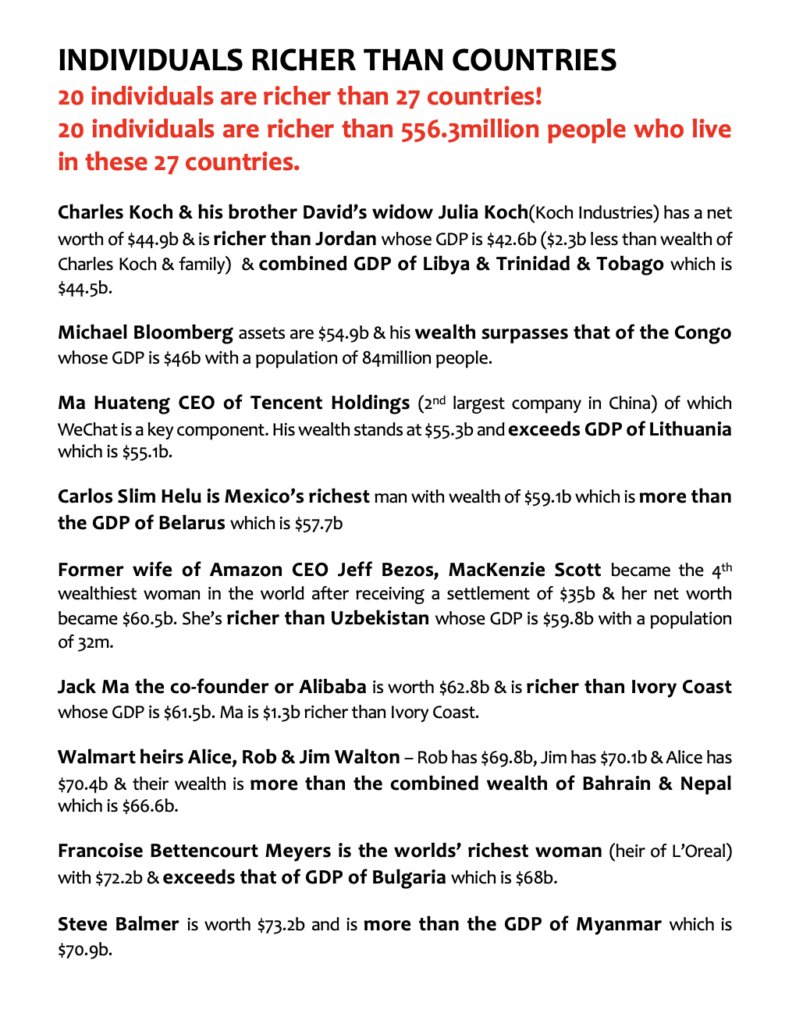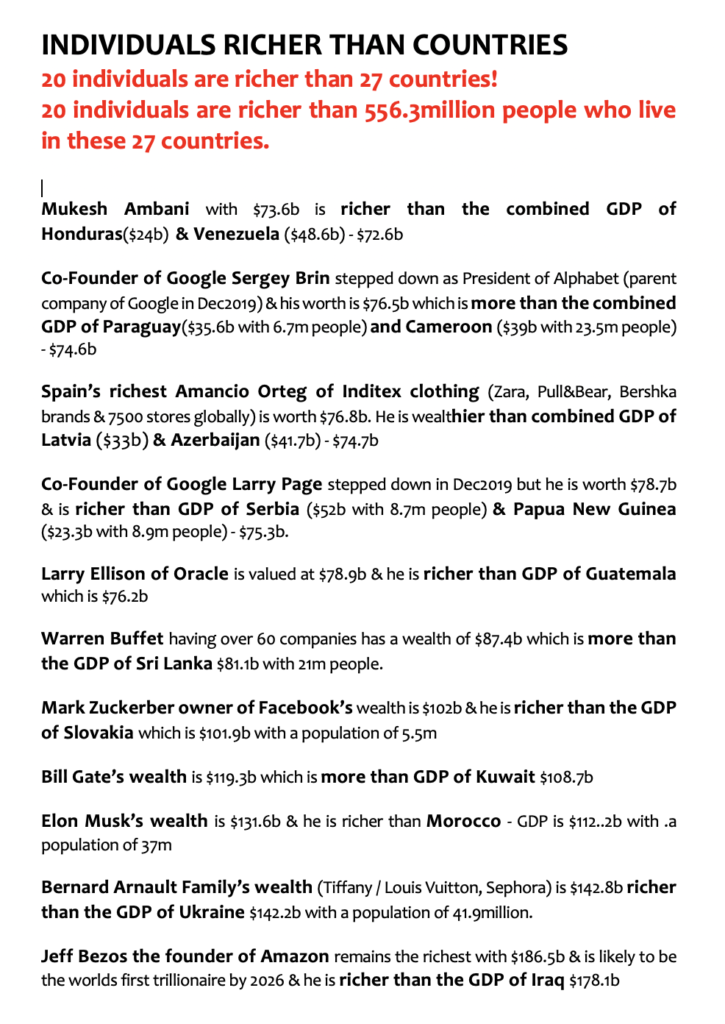Sri Lanka needs a Happy-Economic Model & so does the world
Posted on September 28th, 2023
Shenali D Waduge

The world faced 2 World Wars that killed over 70million people. Annually an estimated 60million deaths occur globally while global population is now close to 8billion. Global youth account for 1.2billion people (age 15-24) while global senior citizens stand at around 771million. Global extreme poverty has risen from 8.4% in 2019 to 9.3% in 2022. The global pandemic resulted in the deaths of 6.9million people. Yet from March 2020 to December 2020 the wealth of global billionaires increased by $3.9trillion, global workers combined earnings fell by $3.7 trillion & left 72m in extreme poverty (ILO) as a result of people losing their jobs. The richest 1% (owning more than $1m) owns 46% of the world’s wealth. Adults with less than $10,000 in wealth make up 52.5% of the world’s population & owns 1.2% of global wealth. Those who have more than $30m hold 6.5% of total global wealth (they are just 0.003% of global populace) The world’s 10 richest billionaires, according to Forbes, own an astonishing $1.448 trillion in combined wealth. The globe is home to 2,755 billionaires, according to the 2021 Forbes. We are living in an inequal world. An inequal world is both unhappy & in lack. Paper proposals, global rhetoric & global conferences has not changed this status quo and never will. A new thinking & new approach is needed.
Inequality is rampant in the developed & industrial world too.
The top 1% in the United States holds 40.5% of national wealth. 7.4 million individuals owning at least $1 million worth of investable assets. Between 2020 and 2021, the number of Americans in the $50 million-plus club increased by over 30,000 – more than in any other country. Inequality is rising in the US faster than any other developed nation. CEO’s compensation increased by 900% while workers increase by just 11.9% – their salaries will show.
When 25 individuals are richer than the GDPs of 27 countries & population of 556.3million people what does that say


Alongside an obvious inequal world, while the poor are understandably unhappy, so too are the rich. The rich often find that money doesn’t buy happiness while the poor think that money can. Majority of the rich suffer some form of depression or dissatisfaction. The poor are equally absorbed in a rat race to not only survive, make ends meet but compete with each other thus landing themselves into debt. This is mostly applicable to the middle class of every society. Clearly, no development can take place where the rich get richer & poor get poorer. The pandemic completely collapsed the financial stability of the middle class. To add to their woes, the rich are introducing new cultural norms making their lifestyles in further calamity (drawing them towards drinking/smoking/LGBTQ/transgender & now preying on children & women) These unless immediately addressed by governments are recipes for further societal disasters & collapse of families & even indivudals.
Nothing is guaranteed – employment doesn’t necessarily provide better health, longer life, or even happiness for those unhappy in their place of employment even though it provides basic needs. However a happy workplace is more productive. Employers & employees agree on this.
How happy are those in State or Public Sector in their current roles. Is their lack of productivity based on their lack of happiness. Is it because they are doing a job they do not like or a job they are unsuited for? Is this due to selection errors?
How do we then turn this into a model to align with national development goals. Happiness is a vital outcome to both the society & economic activity. A development framework must have happy programs for people to sustain their growth. The lack of such is what makes people unhappy – Singapore is a good example. All citizens are simply robots.
Sri Lanka is well placed for such – we have a colourful and historical cultural heritage full of traditions, rituals and much more. We do not need to import new cultures that are counter productive to the native cultures. This is where a societal mismatch takes place. Adopting foreign cultures, thinking them to be the fantastic model is likely to destroy the individual and become a headache to the state (drugs, pornography, excessive liberalism etc)
Sri Lanka’s post-independence management by politicians, public sector & even private sector has not been to a national policy framework & sans targets. Political-driven ad-hoc development drives reversing good initiatives with change of government has been the norm. Private-sector too has been more worried about profitting for itself than working in cohesion with other private sector towards a common national goal aligned to government goals where both entities could have shared the development initiatives – infrastructure by the Government & components of happiness initiatives by the private sector concentrating on the softer aspect.
Given that Sri Lanka is in a state of default & unhappy overall – any initiative properly designed to leverage the economy while making people happier will definitely see dividends. When the starting point is poverty & it gets raised, people become definitely happier. Therefore, we are on a good pedestal if we can start off properly.
We must first identify the minimum requirements for all citizens & their respective levels to be economically better & the desired associated happiness outcomes. It should ideally come in 3 tiers – the transitory happiness / satisfaction happiness & overall happiness.
Whether poor – middle class or rich, there are 4 areas that a government must cater to:
Good governance: State apparatus must have a fundamental slab of basic requirements that provides a productive outcome in workflow, productive workers & happy citizens
Socio-Economy: State apparatus must find ways together with the private sector to combine social & economic contributions resulting in a healthy & happy outcome.
Culture & Traditions: State apparatus & Private Sector must work on preserving & promoting native culture & traditions
Environment: State apparatus & private sector must combine to ensure Sri Lanka’s water, energy, flora & fauna are protected & preserved and the aesthetic healing of nature is untainted.
The world cannot continue with such inequalities that nurture hatred, envy and even result in violence. What can people increasing their trillions really do? Are they going to take that to their graves? How best can they make use of that wealth for a happier world? Why would they want to dump that wealth into insidious gameplans like depopulating the world through pandemics or rolling out transgenderism even among children to break up the institution of marriage, family & procreation? Are such sadisms healthy even for those who plan them or practice satanic rituals thinking themselves a cult above the rest? No cult and no satan can prevent death or even karma. This is the reality of life.
Governments comprising representatives of the people are expected to strategize national goals and raise every segment of society. Development is not concrete structures and skyscrapers as Singaporeans are beginning to realize.
A nation is made up of people, people’s happiness must go parallel to economic development. Any development initiatives must be complimented with parallel happiness programs.
Young economists must come up with a suitable formula where socio-economic-happiness has a minimum level for the poor-the middle class & the rich and development runs parallel to this.
Now that Sri Lanka is at the bottom of the pit – we can restart with a proper program of economic happiness and its success can be shared with the rest of the world.
Shenali D Waduge